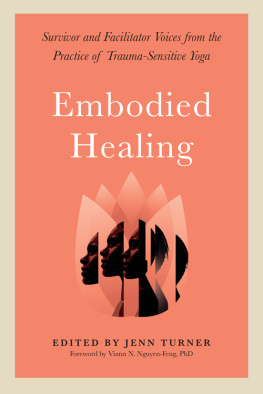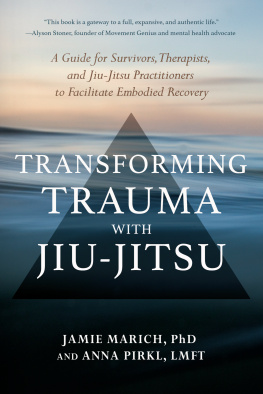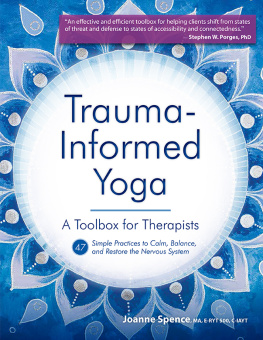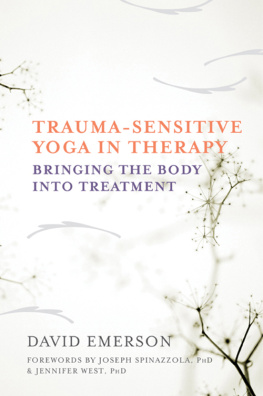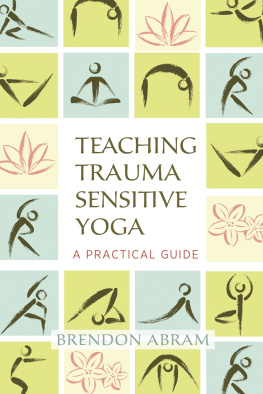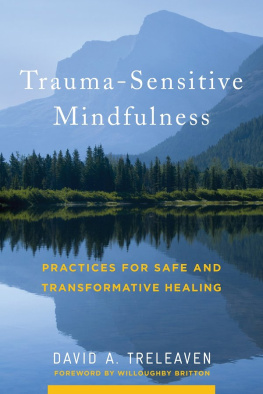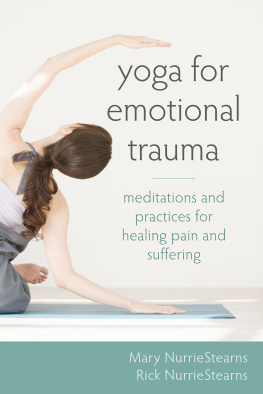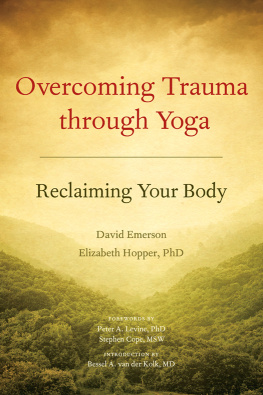
Copyright 2020 by Jenn Turner. All rights reserved. No portion of this book, except for brief review, may be reproduced, stored in a retrieval system, or transmitted in any form or by any meanselectronic, mechanical, photocopying, recording, or otherwisewithout the written permission of the publisher. For information contact North Atlantic Books.
Published by
North Atlantic Books
Berkeley, California
Cover art by Rob Johnson
Book design by Happenstance Type-O-Rama
Printed in the United States of America
Embodied Healing: Survivor and Facilitator Voices from the Practice of Trauma-Sensitive Yoga is sponsored and published by the Society for the Study of Native Arts and Sciences (dba North Atlantic Books), an educational nonprofit based in Berkeley, California, that collaborates with partners to develop cross-cultural perspectives, nurture holistic views of art, science, the humanities, and healing, and seed personal and global transformation by publishing work on the relationship of body, spirit, and nature.
North Atlantic Books publications are available through most bookstores. For further information, visit our website at www.northatlanticbooks.com or call 800-733-3000.
This book contains material that may be triggering, including references to self-harm, eating disorders, sexual abuse, or trauma.
The following information is intended for general information purposes only. Individuals should always see their health care provider before administering any suggestions made in this book. Any application of the material set forth in the following pages is at the readers discretion and is his or her sole responsibility.
Library of Congress Cataloging-in-Publication Data
Names: Turner, Jenn, editor.
Title: Embodied healing : survivor and facilitator voices from the practice
of trauma-sensitive yoga / Jenn Turner, editor.
Description: Berkeley, California : North Atlantic Books, [2020] | Includes
index. | Summary: A collection of essays exploring the applications of
TCTSY (Trauma Center Trauma Sensitive Yoga) as an evidence-based
modality to help clients heal in the aftermath of traumaProvided by
publisher.
Identifiers: LCCN 2020017363 (print) | LCCN 2020017364 (ebook) | ISBN
9781623175344 (paperback) | ISBN 9781623175351 (ebook)
Subjects: LCSH: Psychic traumaPhysical therapy. | YogaTherapeutic use.
Classification: LCC RC552.T7 E43 2020 (print) | LCC RC552.T7 (ebook) |
DDC 616.85/21dc23
LC record available at https://lccn.loc.gov/2020017363
LC ebook record available at https://lccn.loc.gov/2020017364
This book includes recycled material and material from well-managed forests. North Atlantic Books is committed to the protection of our environment. We print on recycled paper whenever possible and partner with printers who strive to use environmentally responsible practices.
This book is dedicated to each survivor who has courageously taken a step into the unknown by joining us on our inquiry of how to reclaim embodiment in the aftermath of trauma; to my loving family, Ben, Annabel, and Emma, whose support for this project has been unwavering and steadfast; and to the wise, insightful, and dedicated contributors who made this book possible.
Foreword
When youre breathing, when youre moving, when you open yourself up to that new experience, theres somethingI do believe that theres something that is there. Theres energy, theres mystery, theres connection, solidarity. Its power... it adds another dimension to the healing in group. I see it, I feel itI do not know what the words exactly are, and Im sure there are words that could describe it more. Theres something vulnerable about it too, theres that connection in our vulnerability that can be pretty powerful.
Trauma-sensitive yoga research participant, excerpted from Nguyen-Feng et al. (2019) Spirituality in Clinical Practice article
I remember the exact moment when I first heard of trauma-sensitive yoga. Even now, I remain in awe and appreciation of the seemingly serendipitous, intertwining paths that led me to it. Shortly after making the move halfway across the country for my counseling psychology doctoral studies, I decided to participate in a local womens health conference hosted by the University of Minnesota. Im not sure what compelled me to take on such a task two weeks into a new city and program, but that is one part of the serendipity.
At the conference, I presented a poster on a very small pilot study that I had conducted on yoga and prenatal health perceptions. I only pursued this pilot study because the researcher for whom I previously worked (Dr. James Blando, Old Dominion University/Eastern Virginia Medical School) suggested that I start a yoga project. This was definitely far from the scope of his community and environmental health lab. But because of the time I had put into the lab, he was simply extending a generous opportunity to support me on an outside project related to a known interest of mine. I hadnt even considered conducting research on something that I viewed as a non-academic practice, but I took on the task. And so, that is how I ended up at the womens health conference.
Standing forlornly in front of my poster that was solitarily situated at the endcap of an aisle (Im sure many researchers can relate!), I shyly smiled at an individual who was meandering around the space. She kindly paused to read my poster and asked me about my next steps in the presented project. I informed her that the yoga research was simply a side project, as I was refocusing my research on interpersonal trauma. In turn, she casually informed me that her public health colleague at the university, Dr. Cari Jo Clark, was integrating these two areas in a trauma-sensitive yoga study. And that was the exact moment when I first heard of trauma-sensitive yoga.
Fast forwarding a bit, I connected with the wonderful folks at the Domestic Abuse Project, a community-based nonprofit agency located in Minneapolis, as well as Dr. Cari Jo Clark, who is now at Emory University, and David Emerson, who at the time had recently coauthored his first book, Overcoming Trauma through Yoga: Reclaiming Your Body, which I held in the highest regard. I held it in such regard that I can recall myself sitting in the 717 Delaware Building on campus while holding the unopened book with the utmost care and eagerness. The message of Trauma Center Trauma-Sensitive Yoga (TCTSY) resonated with my whole beingmy body and my mind, my belief in the inextricable link between mental and physical wellness, and my belief that our bodies in the present hold our pains from the past. Collaboration with this inspirational team culminated in the first feasibility study of TCTSY, which was published in Complementary Therapies in Clinical Practice in 2014. My research line on mind-body trauma care was taking root.
The impacts of trauma-sensitive yoga can be difficult to express in words, as the effects are simply and truly felt, deeply and internally. The idea of embodiment, of connecting to our inward wisdom and experiences, intrinsically implies a wordlessness in understanding oneself on such a level. As one research participant recounted to me in regard to her trauma-sensitive yoga experience: Theres energy, theres mystery, theres connection, solidarity. Its power... it adds another dimension to the healing in group. I see it, I feel itI do not know what the words exactly are, and Im sure there are words that could describe it more.
Jenn Turner skillfully takes on that challenge. The book that you are holding in your hands contains spoken and unspoken treasures, explicit words and implicit feelings. You are holding a collection of stories that have not been so viscerally told altogether at any point in this world. These are narratives of resilience, of individuals reentering their bodies following the aftermath of trauma and of individuals supporting others in reentering and refriending their bodies. To me, reading
Next page
